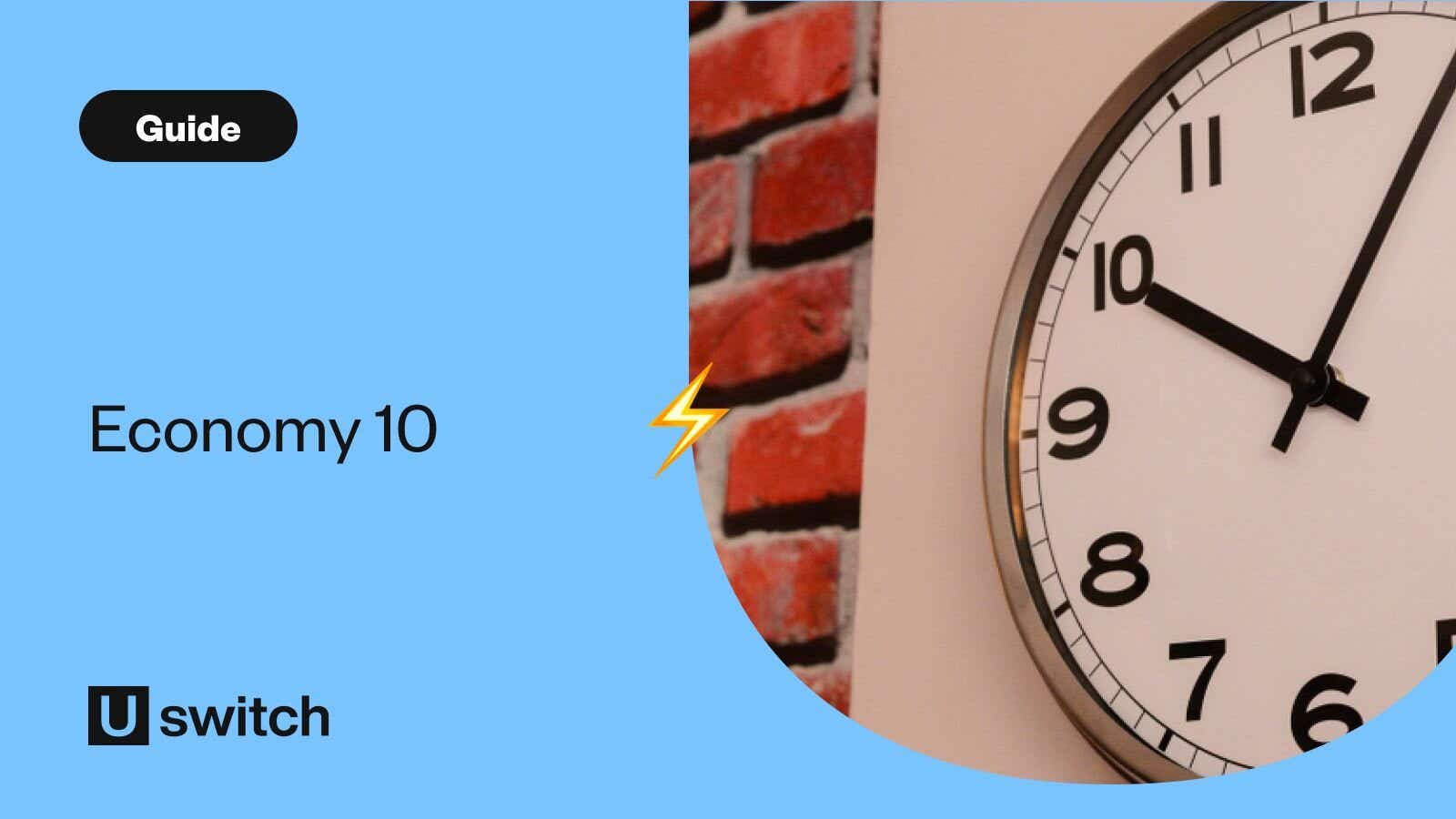Understanding Economy 10 tariffs - are they right for you?


What is Economy 10?
Economy 10 offers ten hours of cheaper night-time energy use (with daytime hours usually more expensive to balance the overall cost out). This can be beneficial for those whose circumstances mean they use energy mostly at night.
Economy 10 is similar to Economy 7 and white meter tariffs, which you may be familiar with.
Please note that Uswitch does not currently allow households to switch between Economy 10 plans.
How does an Economy 10 tariff work?
An Economy 10 tariff provides you with the same energy as any other tariff, but during ten off-peak hours of the day, your energy will cost less. The Economy 10 discounted rates are typically broken down into seven hours at night, and three hours during the day. While Economy 10 offers unit rates of up to half the price of peak rates, the standing charges are often higher.
How can I take advantage of an Economy 10 tariff?
To make the most of an Economy 10 tariff:
- Your property should be based on an electric rather than gas heating system.
- You should use the majority of your energy during the off-peak hours. This means running your heating and appliances during the night and late evening.
You should be aware that Economy 10 tariffs typically only offer five hours of heat at night (complemented with three in the afternoon and two in the evening). You will also need to make sure your major appliances, like your washing machine, dishwasher and tumble dryer, have timer settings so they can be operated at night.
On that note, it's also worth thinking about where your appliances are located. It’s no good having a washing machine with a timer if it is located next to your bedroom and will keep you up all night.
Can I use my normal meter with an Economy 10 tariff?
No. A standard meter will only give you one meter reading, whereas for Economy 10 you will need two different meter readings. As such, switching to an Economy 10 tariff will mean having a new meter installed. Your energy supplier might be able to do this for you, but may charge a fee to do so as they're fairly uncommon.
Similarly, if you are switching away from Economy 10 to a standard tariff, you may need to pay a fee to have a standard meter installed. Whilst this shouldn’t discourage you from switching to or from Economy 10, it’s worth keeping the potential cost in mind.
Who are the Economy 10 suppliers?
One of the main problems with Economy 10 is that there simply aren't many Economy 10 suppliers available. When combined with the fact that most price comparison sites (including Uswitch) don't compare Economy 10 deals and the issue of installing an Economy 10 meter, you may not be able to find an Economy 10 deal. Economy 7 is a viable alternative, though.
What are the disadvantages of using Economy 10?
As mentioned above, there are a few disadvantages associated with Economy 10 including:
- Lack of suppliers offering Economy 10 deals
- Difficulty installing an Economy 10 meter
- High energy rates during the daytime.
You have to have a more disciplined lifestyle with Economy 10 tariffs, and use the majority of your energy during the designated times. If you end up using a lot of energy outside of these times, the higher rates could mean you end up paying more than you thought you would.
While timing your energy use can be relatively straightforward, the colder winter months in particular can disrupt your schedule as you may want the heating to come on sooner. Finally, the off-peak times that fall under your Economy 10 tariff vary from supplier to supplier and region to region. This means that if you chose to switch from one Economy 10 plan to another, you may need your meter to be reprogrammed by an engineer.
How is Economy 10 different from Economy 7?
If you're considering the merits of Economy 7 versus Economy 10, the difference is simply the number of off-peak hours. While Economy 7 offers you seven hours of off-peak energy at night only, Economy 10 adds three daytime hours, usually in the afternoon.
What are the Economy 10 times?
The Economy 10 times will vary by tariff and supplier. For instance, they could be:
- Three hours in the afternoon, four in the evening and three in the early morning
- Two hours at lunchtime, three in the evening, five overnight
- Four hours in the afternoon, two in the evening, four in the early morning.
If you're thinking about signing up to an Economy 10 tariff, make sure the times work for your lifestyle and energy usage needs.
How else can I cut my gas and heating bill?
While it’s tempting to use an Economy 10 plan to take advantage of off-peak energy, the simpler way to cut your energy bills is simply to reduce your consumption.
For instance, try turning your thermostat down a little, and making sure you have energy-saving lightbulbs installed throughout your property. You should also be aware of buying new energy-intensive appliances like flat-screen TVs. And when it comes to doing the washing, 90% of your washing machine’s energy is spent by heating the water, so try and use lower temperatures.
When it comes to retaining heating, besides closing doors and windows, make sure your draught proofing and insulation is up to scratch.
Loft insulation is the most cost-effective way to retain heat in your property. Read our loft insulation guide for more information.
Similarly, draught-excluders around the edges of doors, windows and in fireplaces can make a huge difference, and are cheap to buy and easy to install.